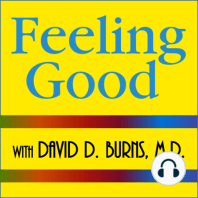84 min listen

123: Ten MORE Errors Therapists Make (Part 1)
123: Ten MORE Errors Therapists Make (Part 1)
ratings:
Length:
46 minutes
Released:
Jan 14, 2019
Format:
Podcast episode
Description
I was concerned that our recent “Ten Most Common Therapist Errors” show might antagonize people, but we got quite a lot of positive and encouraging feedback from listeners, which was surprising to me. As a result, Fabrice and I decided to take a chance and publish two more shows on common therapist errors this week and next week. We hope you like these shows! Make sure you let us know what you think, and let me apologize in advance if I come across as annoying or overly cynical. All of the errors I describe are correctable; the goal is to improve the treatment of individuals struggling with depression, anxiety, troubled relationships, or habits and addictions. Thanks! Here are the five errors discussed in today's show. 1. Failure to hold patients accountable. Example, the therapist may let the depressed patient slip by without doing psychotherapy homework, since the patient insists he or she doesn’t have enough time or motivation to do the homework; or the therapist may agree to treatment an anxious patient without using exposure, since the patient may resist exposure; or a patient may treat someone with a relationship conflict without exploring the patient’s role in the problem, and so forth. David argues that this rarely or never leads to significant change, much less recovery. However, many therapists, and perhaps most, get seduced into this error for a variety of reasons. 2, The “corrective emotional experience.” This is the belief that the patient’s long-term relationship with the therapist will be sufficient for growth and recovery, without having to do any psychotherapy homework or be accountable. Therapist may imagine himself or herself as the loving and nurturing parent the patient never had. David argues that this caters to the therapist’s ego and feeds into what the patient wants as well—a long-term relationship built on schmoozing. But does it lead to recovery? Here’s David’s short answer: Nope! Warmth, empathy, and trust are necessary ingredients for good therapy, but they are simply not sufficient. Your patient may think you’re the most wonderful and supportive listener in the world, but that will rarely or never lead to recovery from depression, an anxiety disorder, or an addiction, and it will not lead to the skills to heal troubled relationships, either. 3. Responding defensively to patient criticisms. David argues that therapists almost always react defensively to criticisms by patients, such “you don’t’ get me,” or “you aren’t helping,” or “you don’t really care about me.” He describes an interesting five-year study of psychoanalysts in Atlanta, Georgia, sponsored by the National Institute of Mental Health (NIMH), to find out how the analysts responded to patient criticisms. You may find the results surprising! He gives an example of defensive responding during a workshop he conducted at a hospital in Pennsylvania. Therapists can learn to correct this error with lots of practice with the Five Secrets of Effective Communication, but this requires several things: Using the Patient’s Evaluation of Therapy Session after each session so can quickly pinpoint empathy / relationship failures. Lots of practice with the Five Secrets. Humility, and the willingness to see the world through the eyes of the patient. This requires the “Great Death” of the therapist’s ego! 4. Joining a school of therapy and treating everything with the same method or approach. Can you imagine what it would be like if medicine was organized like this, with “schools of therapy,” like the “penicillin school”? David apologetically argues that the abolition of all schools of therapy would be a good thing. Fabrice disagrees, and argues that the treatment of psychological problems is inherently different from the treatment of medical disorders. Let us know what YOU think! 5. Confirmation paradox. I (David) majored in the philosophy of science in college, and this was one of the first topics, and it definitely applies to our thinking about the ca
Released:
Jan 14, 2019
Format:
Podcast episode